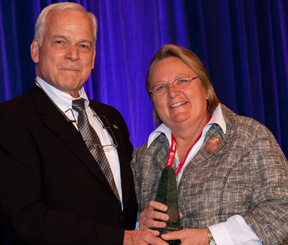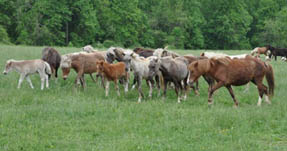By Carrie Havranek
As she grew up on a Pennsylvania dairy farm, Sue Miller McDonnell ’73 of West Chester, Pa., probably never envisioned being jokingly called “Dr. Ruth for horses.” However, her internationally respected research in equine behavior at the University of Pennsylvania New Bolton Center, Kennett Square, Pa., has earned her the unofficial title.
McDonnell is founding head of the Havemeyer Equine Behavior Lab at the university’s School of Veterinary Medicine and an adjunct faculty member at the center.

Sue McDonnell '73 receives the Stubbs Award from AAEP President William Moyer.
McDonnell’s skill set is so singular and valued that she has traveled all over the world—including Peru, Japan, England, and Ireland—to help treat horses. The American Association of Equine Practitioners (AAEP) recently honored her with the prestigious 2011 George Stubbs Award, which is granted to non-veterinarians who have contributed to the equine veterinary profession through research, advocacy, and education.
A recent client visited by McDonnell and her team is War Emblem, the 2002 winner of the Kentucky Derby and Preakness Stakes.
Through her innovative research methods, McDonnell has provided insight into the understanding of equine behavior, physiology, and welfare. Her research in reproductive physiology has led to proven methods for resolving problematic behavior in stallions and mares. Her approach focuses on how human influence alters equine behavior and emphasizes change through positive reinforcement.
McDonnell has also worked with AAEP to address welfare issues related to the pregnant mare urine industry in the United States and Canada.
A psychology graduate, McDonnell transferred to Lafayette her junior year from Keystone College. “At the time, it was really unusual for a college to have a strong experimental psychology program, and Lafayette did,” she says.
Interestingly, McDonnell got involved in research on horses by accident. “I grew up on a farm, but I didn’t realize until I got to college that people actually studied animal behavior.”
A conversation with her former next-door neighbor, Dr. John Hurtgen, a veterinarian who worked at New Bolton Center, pointed her toward the untapped niche. Hurtgen, who was working with horses having trouble breeding, mentioned the dearth of expertise in animal physiology and behavior.
“It’s something vets typically don’t spend a lot of time on in school,” she says. “Yet the number one reason animals and pets are euthanized or given up has to do with their behavior.”
McDonnell, who is married to mechanical engineering graduate Frank McDonnell ’73, resumed her education when their daughter Eleanor was young. She earned a master’s degree in psychology with a focus on animal behavior from West Chester University and a Ph.D. in reproductive physiology and behavior from University of Delaware. In addition, she is certified in applied animal behavior.
McDonnell completed a National Institutes of Health-sponsored post-doctoral fellowship on the the physiology of equine sexual dysfunction at New Bolton Center. Because horses can often serve as models for other mammalian behavior, specifically humans, her work contributed to research that led to the development of medications for enhancing sexual function—earning her the nickname “Dr. Ruth for horses.”
Today, McDonnell’s research is particularly focused on stallion behavior.

Semi-feral herd maintained for scientific observation at the New Bolton Center
Since 1994, McDonnell has maintained a semi-feral herd of horses at New Bolton Center. She and other researchers can study the animals under natural social conditions. Students can also observe the differences in behavior between free-running and domesticated horses.
Studying the herd enables her to see how humans accidentally mess things up. “Most of my clinical work is rehabbing and changing the domestic situations of horses,” she says.
The author of Understanding Horse Behavior and The Equid Ethogram: A Practical Field Guide to Horse Behavior, McDonnell writes a monthly column for The Horse. She serves on Animal Behavior Society’s Board of Professional Certification and on the organizing committee of the International Symposium on Equine Reproduction.


1 Comment
Does McDonnell undergo a farrier training during her time? or I must say was there already a training courses during her time? It was just surprising that she only learn all of this through research and no actual training. Nowadays if you want to engage in this field training is a must and getting a certificate is a must. Well this is a very nice story mate.
Comments are closed.